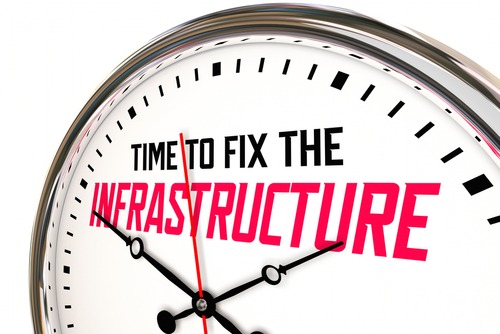
As the U.S. House of Representatives moves to consider the Infrastructure Investment and Jobs Act (IIJA), President Joe Biden’s infrastructure investment plan, Senate Republicans and more than 100 industry organizations are urging the House to pass the bill.
In a letter to her democratic colleagues, House Speaker Nancy Pelosi (D-Cal.) said the bill would come to the floor for debate on Sept. 27, but would not be up for a vote until Thursday, Sept. 30.
“This week is a week of opportunity, as we work to keep government open, conclude negotiations on the Build Back Better Act and advance the Bipartisan Infrastructure Framework,” Pelosi said in her letter.
Sept. 30 is also the day the Fixing America’s Surface Transportation (FAST) Act expires. The bill that authorized surface transportation expenditures between FY2016-FY2020, the FAST Act was set to expire on Sept. 30, 2020. However, Congress voted to give it a one year extension as part of the 2021 Continuing Appropriations Act.
Some Democrats have signaled that they would not support the bill if it doesn’t include the more progressive social bill, while moderate Democrats have balked at the $3.5 trillion price tag of the combined bills. Some Republicans have said they won’t support the bill because of its price tag and progressive policies.
Some Senate Republicans, however, are urging members of the House to pass the infrastructure bill.
In a letter Friday, U.S. Sens. Susan Collins (R-ME), Rob Portman (R-OH), Bill Cassidy (R-LA), Lisa Murkowski (R-AK) and Mitt Romney (R-UT) urged House members to pass the bipartisan infrastructure bill that has already passed in the Senate by a vote of 69-30.
“Passage of the historic bipartisan Infrastructure Investment and Jobs Act on Monday would be a great victory for the American people. It will modernize and upgrade our roads, bridges, ports, and broadband; increase the resiliency of our electric grid and coastal areas; and create jobs and long-term economic growth without raising taxes on everyday Americans or increasing inflation,” the Senators said in the letter. “Importantly, this bipartisan bill is a testament to what Congress can achieve when we put partisanship aside and focus on moving the country forward. Congress has talked about modernizing our nation’s infrastructure for as long as we can remember. The bipartisan Infrastructure Investment and Jobs Act deserves the support of House Republicans and Democrats alike.”
The five senators were part of the Problems Solvers Caucus, a bipartisan group of 20 Congressmembers who came together to draft the infrastructure bill.
Industry groups are also pushing for passage of the bill.
In a letter signed by 110 industry organizations, leaders said the package would provide economic and quality of life enhancements to communities across the country.
“The investments made in the package would facilitate long overdue repairs and improvements to our roads, bridges, rail, and public transportation, and other critical infrastructure, such as airports, ports, broadband, energy, and water systems,” the letter said. “The investments included in the IIJA would create good-paying jobs through project construction in the short term and provide improved safety and mobility for people and goods for decades to come in every single state.”
Led by the American Association of State Highway and Transportation Officials (AASHTO), the American Road and Transportation Builders Association (ARTBA), the Associated General Contractors of America, and the U.S. Chamber of Commerce, the letter said that not only would the bill “facilitate long overdue repairs and improvements to our roads, bridges, rail, public transportation, and other critical infrastructure, such as airports, ports, broadband, energy, and water systems,” but would continue FAST Act funding.
“By including a five-year reauthorization of federal highway, public transportation, and passenger rail programs, the agreement would also ensure states and localities have much-needed funding and policy certainty to proceed with planned projects,” the groups wrote in the letter. “These programs are currently operating under an extension set to expire September 30, and the Federal Highway Administration recently warned the Highway Trust Fund could face cash shortfalls as early as November, which will severely disrupt highway projects.”